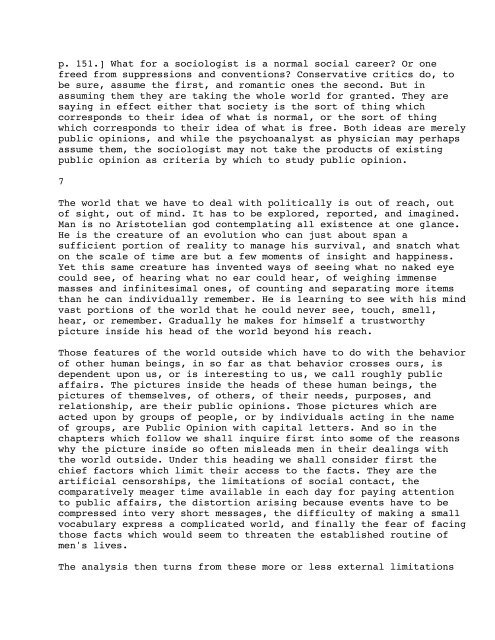PUBLIC OPINION by WALTER LIPPMANN TO FAYE LIPPMANN ...
PUBLIC OPINION by WALTER LIPPMANN TO FAYE LIPPMANN ...
PUBLIC OPINION by WALTER LIPPMANN TO FAYE LIPPMANN ...
You also want an ePaper? Increase the reach of your titles
YUMPU automatically turns print PDFs into web optimized ePapers that Google loves.
p. 151.] What for a sociologist is a normal social career? Or one<br />
freed from suppressions and conventions? Conservative critics do, to<br />
be sure, assume the first, and romantic ones the second. But in<br />
assuming them they are taking the whole world for granted. They are<br />
saying in effect either that society is the sort of thing which<br />
corresponds to their idea of what is normal, or the sort of thing<br />
which corresponds to their idea of what is free. Both ideas are merely<br />
public opinions, and while the psychoanalyst as physician may perhaps<br />
assume them, the sociologist may not take the products of existing<br />
public opinion as criteria <strong>by</strong> which to study public opinion.<br />
7<br />
The world that we have to deal with politically is out of reach, out<br />
of sight, out of mind. It has to be explored, reported, and imagined.<br />
Man is no Aristotelian god contemplating all existence at one glance.<br />
He is the creature of an evolution who can just about span a<br />
sufficient portion of reality to manage his survival, and snatch what<br />
on the scale of time are but a few moments of insight and happiness.<br />
Yet this same creature has invented ways of seeing what no naked eye<br />
could see, of hearing what no ear could hear, of weighing immense<br />
masses and infinitesimal ones, of counting and separating more items<br />
than he can individually remember. He is learning to see with his mind<br />
vast portions of the world that he could never see, touch, smell,<br />
hear, or remember. Gradually he makes for himself a trustworthy<br />
picture inside his head of the world beyond his reach.<br />
Those features of the world outside which have to do with the behavior<br />
of other human beings, in so far as that behavior crosses ours, is<br />
dependent upon us, or is interesting to us, we call roughly public<br />
affairs. The pictures inside the heads of these human beings, the<br />
pictures of themselves, of others, of their needs, purposes, and<br />
relationship, are their public opinions. Those pictures which are<br />
acted upon <strong>by</strong> groups of people, or <strong>by</strong> individuals acting in the name<br />
of groups, are Public Opinion with capital letters. And so in the<br />
chapters which follow we shall inquire first into some of the reasons<br />
why the picture inside so often misleads men in their dealings with<br />
the world outside. Under this heading we shall consider first the<br />
chief factors which limit their access to the facts. They are the<br />
artificial censorships, the limitations of social contact, the<br />
comparatively meager time available in each day for paying attention<br />
to public affairs, the distortion arising because events have to be<br />
compressed into very short messages, the difficulty of making a small<br />
vocabulary express a complicated world, and finally the fear of facing<br />
those facts which would seem to threaten the established routine of<br />
men's lives.<br />
The analysis then turns from these more or less external limitations





